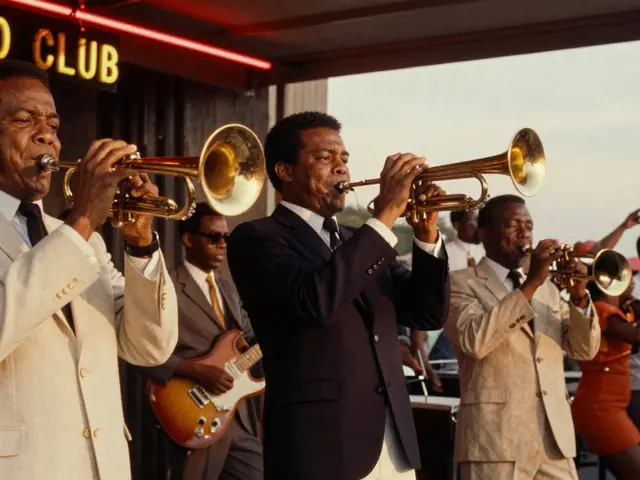Rock music is more than just a series of powerful chords and electrifying performances. It's a rich tapestry woven from different strands of history, culture, and personal expression. From its rebellious beginnings to its mainstream explosion, rock music has continually evolved, embodying the spirit of each era.
Dive with us as we explore rock's historical roots, understand its cultural significance, and revisit the evolution of its sound. We'll journey through the lives of iconic rock legends and share ways to deepen your connection with this timeless genre. Whether you're a longtime fan or a newcomer, there's always something new to discover in the world of rock music.
Historical Roots
Rock music's journey began in the United States during the mid-20th century, a period brimming with cultural revolutions and significant societal changes. It emerged from a blend of various genres like blues, country, jazz, and gospel. African American communities played a crucial role in this evolution, infusing their rich musical traditions into what would eventually become rock and roll. One of the genre's forerunners, Chuck Berry, often cited the influence of blues on his music, which helped shape the energetic and rhythmic sound that rock would adopt.
The early 1950s saw pioneers like Elvis Presley making waves with a blend of country and rhythm and blues which captivated a wide audience. Presley, often referred to as the 'King of Rock and Roll,' brought a youthful vigor and rebellious charm that resonated deeply with the burgeoning teenage demographic. His fiery performances and provocative hip-swiveling dances were nothing short of revolutionary and even controversial. This era marked a turning point, as rock music began crossing race and class barriers, becoming a unifying force among the youth.
Another significant figure from this era was Buddy Holly, who, with his band The Crickets, introduced the concept of a self-contained rock band. Holly's innovative sound and songwriting prowess set the stage for future rock musicians. His tragic death at the young age of 22 only cemented his legendary status, immortalizing hits like 'That'll Be the Day' and 'Peggy Sue'. The tragedy highlighted the volatile nature of the rock star lifestyle and added a mystique to the genre.
"Rock and roll is not a genre but a way to live. It defined an entire generation," said John Lennon, one of the many artists inspired by early rock legends.
In the late 1950s and early 1960s, British bands like The Beatles and The Rolling Stones drew heavily from American rock and blues, creating what would be known as the 'British Invasion.' The Beatles' debut on the Ed Sullivan Show in 1964 was a watershed moment in music history, ushering in a new wave of rock enthusiasm globally. Their innovative studio techniques and eclectic influences expanded the sonic boundaries of rock music.
By the late 1960s, rock had given rise to numerous subgenres. Psychedelic rock, driven by bands like Pink Floyd and The Doors, mirrored the counterculture movement of the time, exploring altered states of consciousness and social liberation. Simultaneously, garage rock bands like The Stooges poured raw energy and angst into their music, laying the groundwork for the punk movement of the 1970s.
The evolution of rock music from its historical roots is a testament to its enduring power and versatility. It captured the spirit of rebellion and transformation, providing a voice for generations seeking change. Rock music's foundation, built on the rich traditions of diverse communities and innovative pioneers, set the stage for an ever-evolving genre that continues to resonate with audiences around the world.
Cultural Significance
Rock music has had an immense impact on culture worldwide. It's more than just sound; it's an expressive force that has shaped lifestyles, attitudes, and even fashion. From its inception in the 1950s, rock 'n' roll was synonymous with rebellion and youthful defiance. It was a time when teenagers began to challenge societal norms, and the music mirrored their quest for freedom.
The Beatles, arguably one of the most influential bands, not only revolutionized music but also served as cultural icons. Their influence extended to fashion, language, and political attitudes. Their songs often contained social commentary, which resonated with a generation facing rapid cultural shifts. In this way, rock music became a vessel for conveying deeper societal messages.
"Rock and roll might not solve your problems, but it does let you dance all over them." — Pete Townshend
Fast forward to the 1960s and 70s, rock was central to the counterculture movement. Events like Woodstock are testament to its cultural power. Woodstock wasn’t just a music festival; it was a gathering of a generation. The lyrics became increasingly political, addressing issues like the Vietnam War, civil rights, and gender equality. Artists like Bob Dylan and Joan Baez used their platform to voice their opinions, serving as the soundtrack to social change.
Looking at fashion, the impact is undeniable. Rock music gave birth to styles that went from leather jackets and ripped jeans to psychedelic patterns and bell-bottoms. Take the punk rock scene of the late 70s as an example. Bands like the Sex Pistols and The Ramones not only created a new musical sound but also established a distinctive aesthetic with their edgy, and often controversial, fashion choices. The punk ethos of DIY (do it yourself) has influenced street wear and fashion culture globally.
Even in technology, rock music pushed boundaries. Bands began experimenting with new instruments and recording techniques. The use of synthesizers and multi-track recording paved the way for modern music production. These innovations made recording more accessible to aspiring musicians, democratizing music creation and leading to the diverse range of genres we enjoy today.
Rock music's cultural significance also extends to film and television. Movies like
Evolution of Sound
Rock music has transformed and adapted over the decades, continuously influencing and being influenced by other musical styles. This constant evolution has kept rock vibrant and relevant. Its journey began in the 1950s with pioneers like Chuck Berry and Elvis Presley. They merged elements of rhythm and blues with country, creating an electrifying and rebellious sound that appealed to the youth of that time.
As the 1960s dawned, British bands like The Beatles and The Rolling Stones reshaped rock music, adding complexity and broadening its appeal. The era saw the birth of sub-genres like psychedelic rock, which took listeners on a journey through mind-expanding melodies, inspired by the cultural and social revolutions of the time. Bands like Pink Floyd and The Doors became symbols of this exploratory phase.
The 1970s ushered in hard rock and heavy metal, pushing the boundaries with louder, more aggressive sounds. Led Zeppelin and Black Sabbath became the torchbearers of this new, powerful direction. Meanwhile, another offshoot, progressive rock, brought a new level of artistry to the genre. Bands like Yes and Genesis used intricate compositions and extended instrumentals to craft elaborate musical landscapes.
The 1980s gave rise to the punk rock and new wave scenes. Punk rock, epitomized by bands like The Ramones and The Clash, returned to a simpler, more direct sound with their raw energy and anti-establishment lyrics. New wave bands, such as Duran Duran and Talking Heads, infused rock with electronic elements and a polished aesthetic, reflecting the technological advancements of the time.
In the 1990s, grunge emerged from Seattle, bringing a darker, more introspective tone. Bands like Nirvana and Pearl Jam became the voice of a generation disillusioned with the excesses of the previous decade. This era also saw the rise of alternative rock, with bands like Radiohead and R.E.M. pushing the genre into new, experimental territories.
As we moved into the 21st century, rock continued to evolve, embracing and incorporating elements from other genres such as hip hop and electronic music. Bands like Linkin Park and Muse exemplified this genre-blending approach, creating unique sounds that resonated with a diverse audience. Today, rock music's evolution is ongoing, as artists continue to innovate and explore new sonic possibilities.
"Rock and Roll keeps changing shape and finding new forms; the spirit of rebellion and creativity that birthed it is always there." - David Grohl
Through each era, rock music has remained a dynamic and vital force, reflecting the changing cultural landscape while always staying true to its roots. Its evolution is a testament to its resilience and enduring appeal.
Legendary Figures
When we talk about rock music, certain names undeniably come to mind—people who not only shaped this genre but also left an indelible mark on music history. One such name is Elvis Presley, often hailed as the King of Rock and Roll. His magnetic charisma and dynamic performances ushered in the rock era in the 1950s. Hits like 'Heartbreak Hotel' and 'Hound Dog' still resonate with fans across generations.
Another giant in rock history is Jimi Hendrix. Known for his sensational guitar skills and electrifying stage presence, Hendrix pushed the boundaries of what rock music could be. His innovative techniques on the electric guitar set new standards. He famously said, 'When the power of love overcomes the love of power, the world will know peace,' capturing not just his approach to music but also life.
Fast forward a bit, and we encounter the legendary band, The Beatles. Comprising John Lennon, Paul McCartney, George Harrison, and Ringo Starr, this British group took the world by storm in the 1960s. Their influence extended beyond music into fashion, culture, and even politics. Songs like 'Let It Be' and 'Hey Jude' serve as anthems that transcend time. Their innovative use of studio techniques changed the way music was produced.
The Unforgettable Queen
Queen, led by the incomparable Freddie Mercury, brought a unique blend of rock that incorporated operatic elements. Released in 1975, 'Bohemian Rhapsody' became one of the most iconic songs in rock history. Mercury's stage presence and vocal range were unparalleled, and his performance at Live Aid in 1985 is often hailed as one of the greatest live performances ever.
Coming closer to contemporary times, Kurt Cobain of Nirvana reshaped rock music in the early '90s with grunge. Cobain's raw talent and heartfelt lyrics resonated deeply with fans. Songs like 'Smells Like Teen Spirit' and 'Come As You Are' became anthems for a new generation, cementing Nirvana’s place in rock history.
"Rock music should never be in intellectual pursuit, it should be an emotional journey," said Kurt Cobain, reflecting his philosophy of music.
These figures, among many others, not only crafted unforgettable songs but also challenged norms, inspired millions, and cultivated a deep, emotional connection with their audiences. By exploring their lives and music, we gain deeper insights into how rock has evolved and why it continues to matter today.
Tips to Appreciate Rock
Rock music, with its wide range and deep roots, can initially seem overwhelming. But appreciating it isn't as hard as you might think. The journey into the world of rock is an exciting one if approached with the right mindset.
First, begin with the classics. Iconic bands like The Beatles, Led Zeppelin, and The Rolling Stones shaped the rock landscape. Their music laid the groundwork for what rock would become. Listening to hits like "A Day in the Life" by The Beatles or "Stairway to Heaven" by Led Zeppelin is a good starting point. These songs are masterpieces that show how rock can tell a story and convey powerful emotions.
Delve into different sub-genres. Rock isn't just one sound; it's a blend of many. From punk rock to metal, from soft rock to progressive rock – each has its own unique flavor. Try listening to some punk bands like The Ramones or Sex Pistols, then switch to progressive rock bands like Pink Floyd and Rush. This way, you can appreciate the versatility and creative depth of rock music.
Research the history behind the music. Understanding the context in which a song was made adds another layer of appreciation. For example, knowing the socio-political backdrop of the 1960s can enrich your experience of protest songs from that era. Books, documentaries, and even podcasts are great resources to dive into the history of rock music.
Attend live concerts. Rock music is best experienced live. The energy, the crowd, and the raw performance elements create an atmosphere that recordings can't capture. Look for local gigs or tribute band performances if big concerts aren’t an option. Even smaller venues can offer surprisingly powerful experiences.
Play an instrument. Playing a guitar riff or a drum beat yourself can deepen your connection to rock music. It doesn’t matter if you're not a pro. The goal is to understand the effort and talent behind those electrifying solos and rhythmic patterns. You might even find a new hobby.
Engage with fan communities. Joining online forums, social media groups, or fan clubs can enhance your appreciation. These communities are treasure troves of information, rare tracks, and fan interpretations. They often organize meetups or listening parties, offering a shared space to enjoy your favorite tracks with like-minded people.
Create themed playlists. Curating your own playlists can be an expressive exercise. You can make a playlist for different moods or activities, like a driving playlist with high-energy rock anthems or a mellow one for relaxing evenings. This helps in discovering deep cuts and underrated tracks that you might have overlooked.
Read lyrics and song meanings. Many rock songs contain poetic lyrics that touch on various aspects of life, love, and rebellion. Sites like Genius offer annotated lyrics and interpretations that can give you a deeper understanding of a song’s meaning. Knowing the story or message behind the words adds another layer to the music.






